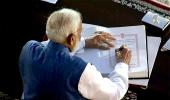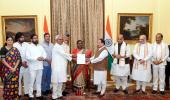Signalling continuity, Prime Minister Narendra Modi on Monday retained Amit Shah, Rajnath Singh, Nirmala Sitharaman and S Jaishankar in charge of the four high-profile ministries -- home, defence, finance and external affairs -- respectively in his new government.

The four ministers in charge of these portfolios make up the crucial Cabinet Committee on Security headed by the prime minister.
Among new entrants to the Union cabinet, former Madhya Pradesh chief minister Shivraj Singh Chouhan has got agriculture and rural development ministries, while BJP president J P Nadda has returned to the health ministry, a portfolio he had held in the Modi government's first term before he took charge of the ruling BJP first as working president in 2019 and then as the full-fledged president in 2020.
Credited with boosting the highway network across the country, Nitin Gadkari has retained charge of the road transport and highways ministry. Former Haryana chief minister Manohar Lal Khattar has been allocated housing and urban affairs, and power ministries.
Ashwini Vaishnaw, a rising star in the government who was in charge of crucial railways, and electronics and information technology ministries, has not only retained these portfolios but has also been given the important information and broadcasting ministry.
Dharmendra Pradhan and Piyush Goyal will also continue to be in charge of the education, and commerce and industry ministries respectively. Hardeep Singh Puri has retained the petroleum and natural gas ministry but has shed the housing and urban affairs ministry.
President Droupadi Murmu directed the allocation of portfolios to 72 members of the Union council of ministers, including the prime minister, as advised by Modi, according to an official statement.
Kiren Rijiju has been moved from Earth sciences to the parliamentary affairs ministry, while Arjun Ram Meghwal will continue as law minister and Sarbananda Sonowal has retained the shipping portfolio. Bhupender Yadav has retained the environment ministry.
Among the five members of the BJP's allies in the Union cabinet, JD-Secular's H D Kumaraswamy has got heavy industries, and steel ministries; Jitan Ram Manjhi (HAM-Secular) has micro, small and medium enterprises ministry, and Lalan Singh (Janata Dal-United) panchayati raj, fisheries, animal husbandry and dairying ministries.
TDP's K Rammohan Naidu has got the civil aviation ministry and LJP-Ram Vilas leader Chirag Paswan has been allocated the food processing industries ministry.
BJP leader C R Patil has got the jal shakti ministry, while another party leader Gajendra Singh Shekhawat, who held the portfolio in the government's previous term, will be the culture and tourism minister.
Amit Shah has also retained the cooperation ministry, while Sitharaman will continue to handle corporate affairs.
Virendra Kumar has retained the social justice and empowerment ministry, while Jual Oram is the new tribal affairs minister.
Pralhad Joshi, who earlier held coal and mines, and parliamentary affairs ministry, has been made in charge of consumer affairs, food and public distribution, and new and renewable energy ministries. G Kishan Reddy has been handed over the coal and mines ministry.
Giriraj Singh has been shifted from the rural development and panchayati raj ministries to textiles. Jyotiraditya Scinda, former aviation minister, is now in charge of communications, and development of north eastern region ministries.
Annapurna Devi is the new women and child development minister.
Among ministers of state with independent charge, BJP ally and RLD leader Jayant Chaudhary has been allocated skill development and entrepreneurship ministry and Shiv Sena leader Jadhav Prataprao Ganpatrao will handle ayush ministry.
Earlier, Modi held the first cabinet meeting after his government was sworn in on Sunday and told his ministerial colleagues that most of them will continue to handle their existing responsibilities.
The allocation of portfolios underlined the prime minister's faith in his colleagues, especially those handling the frontline ministries which shaped and drove the government's policies and programmes.










